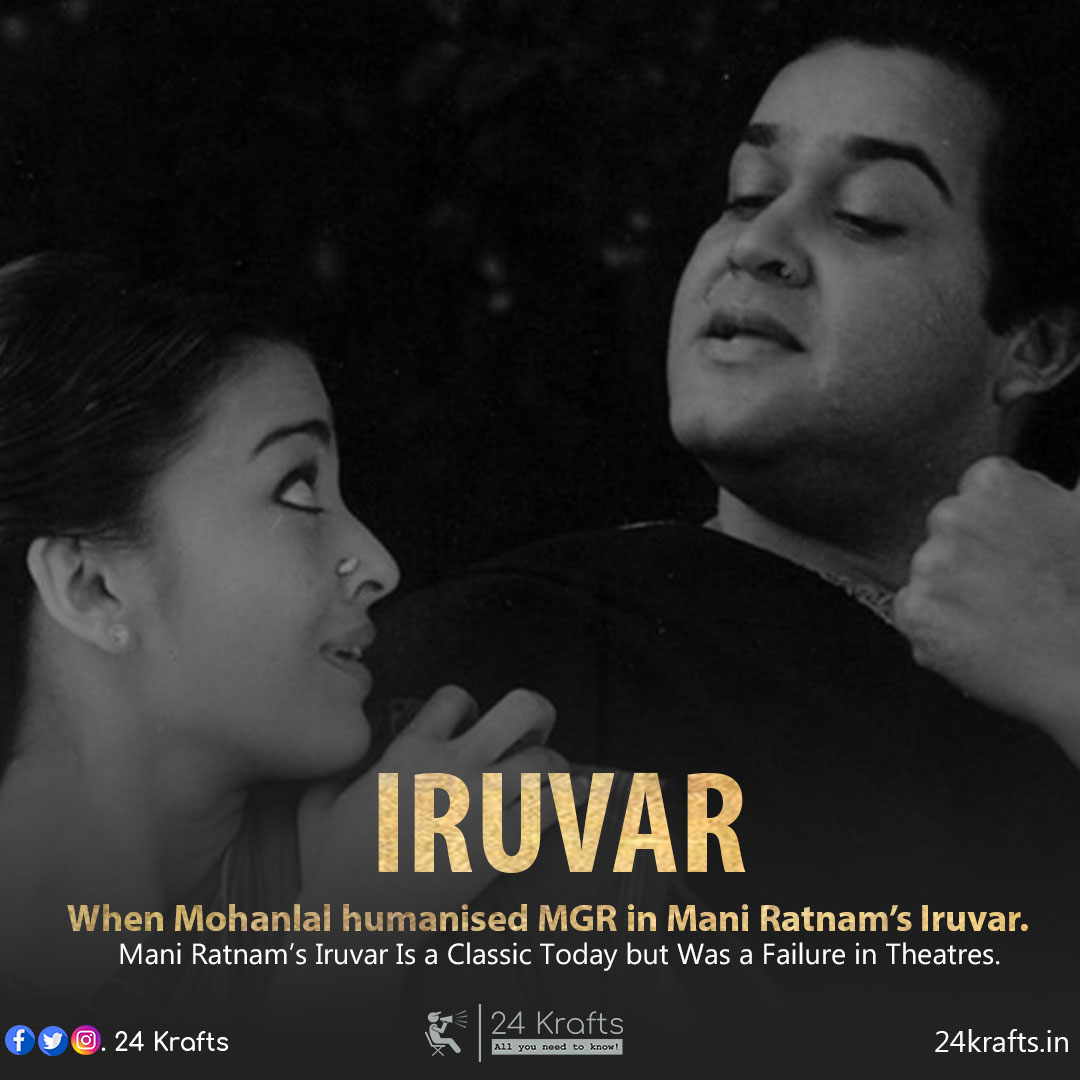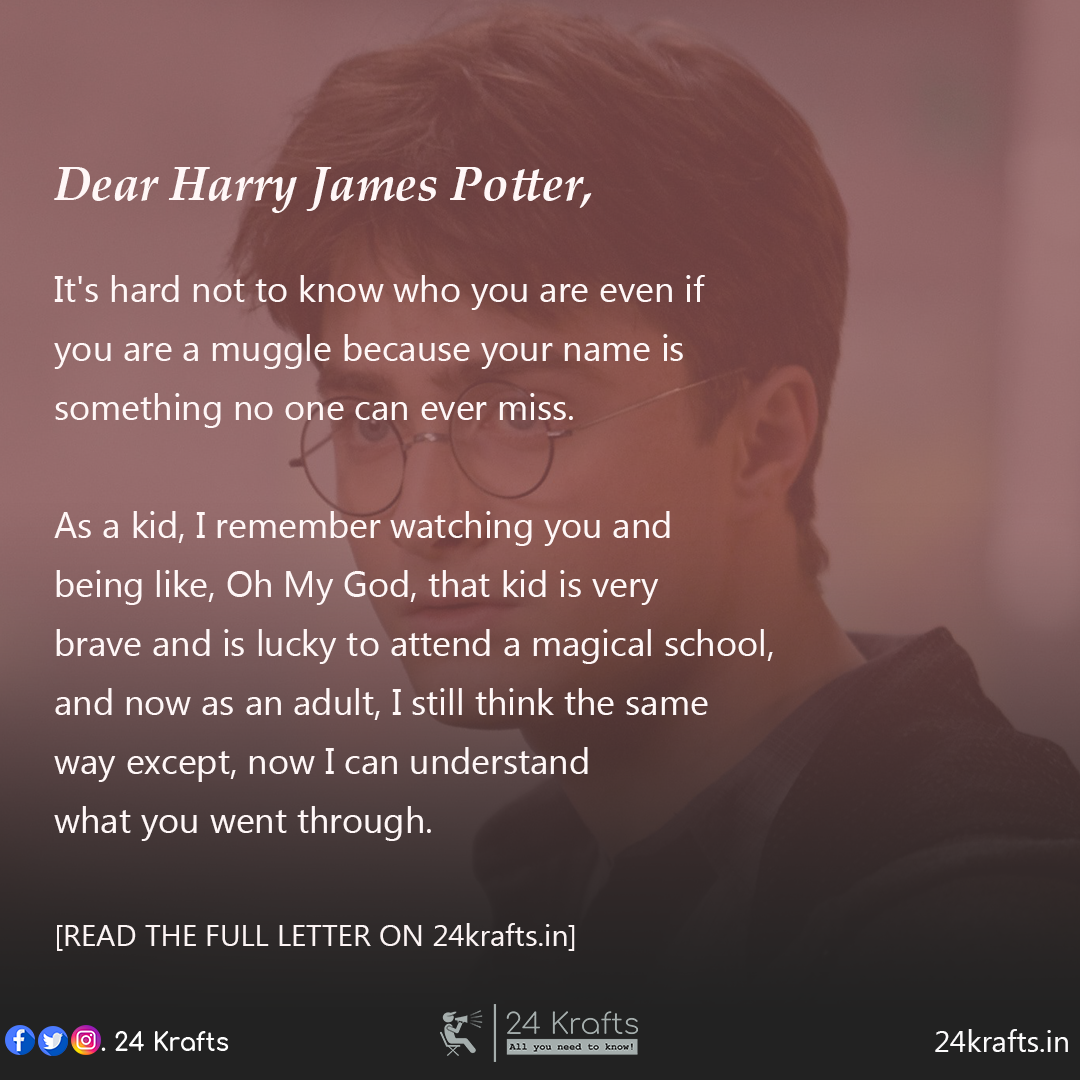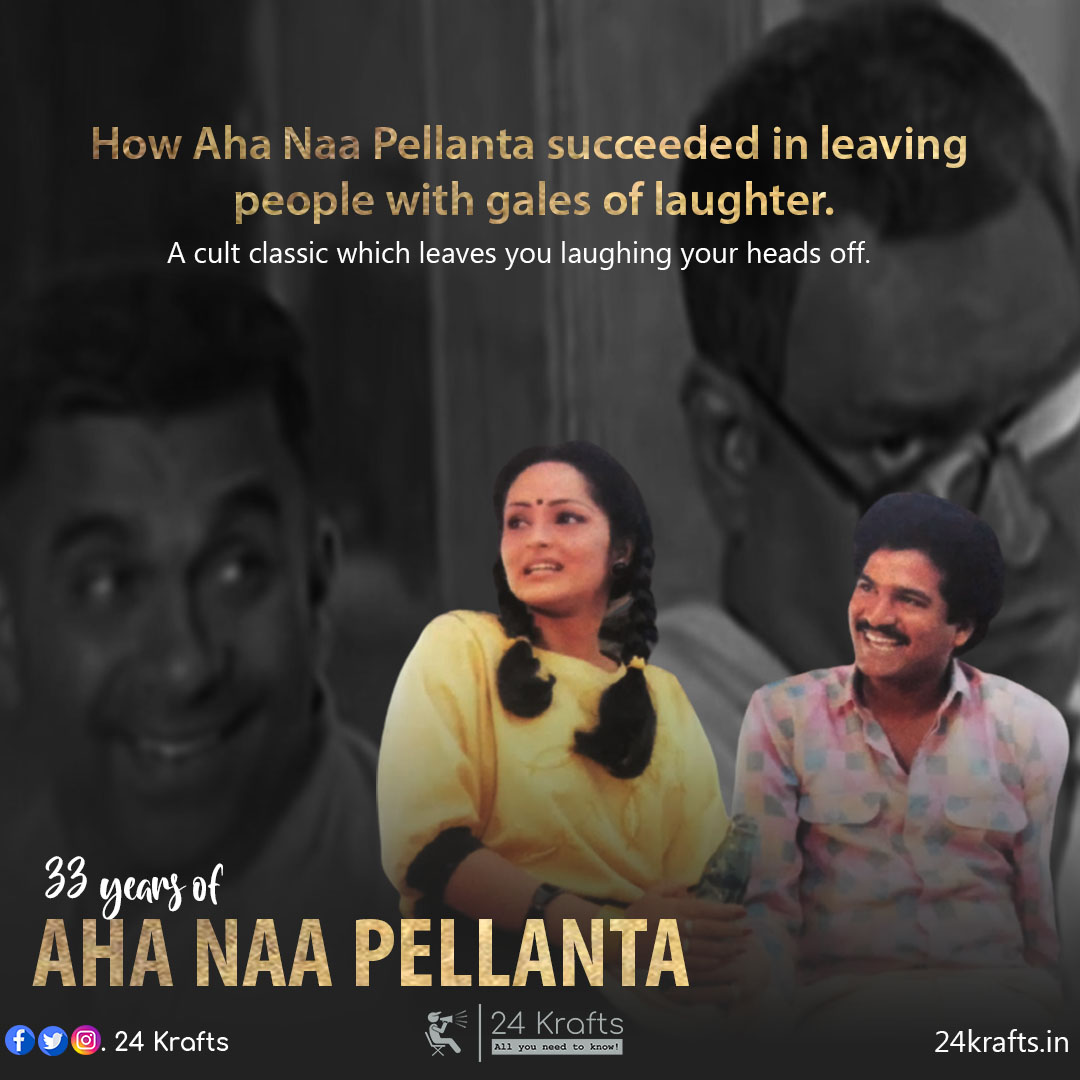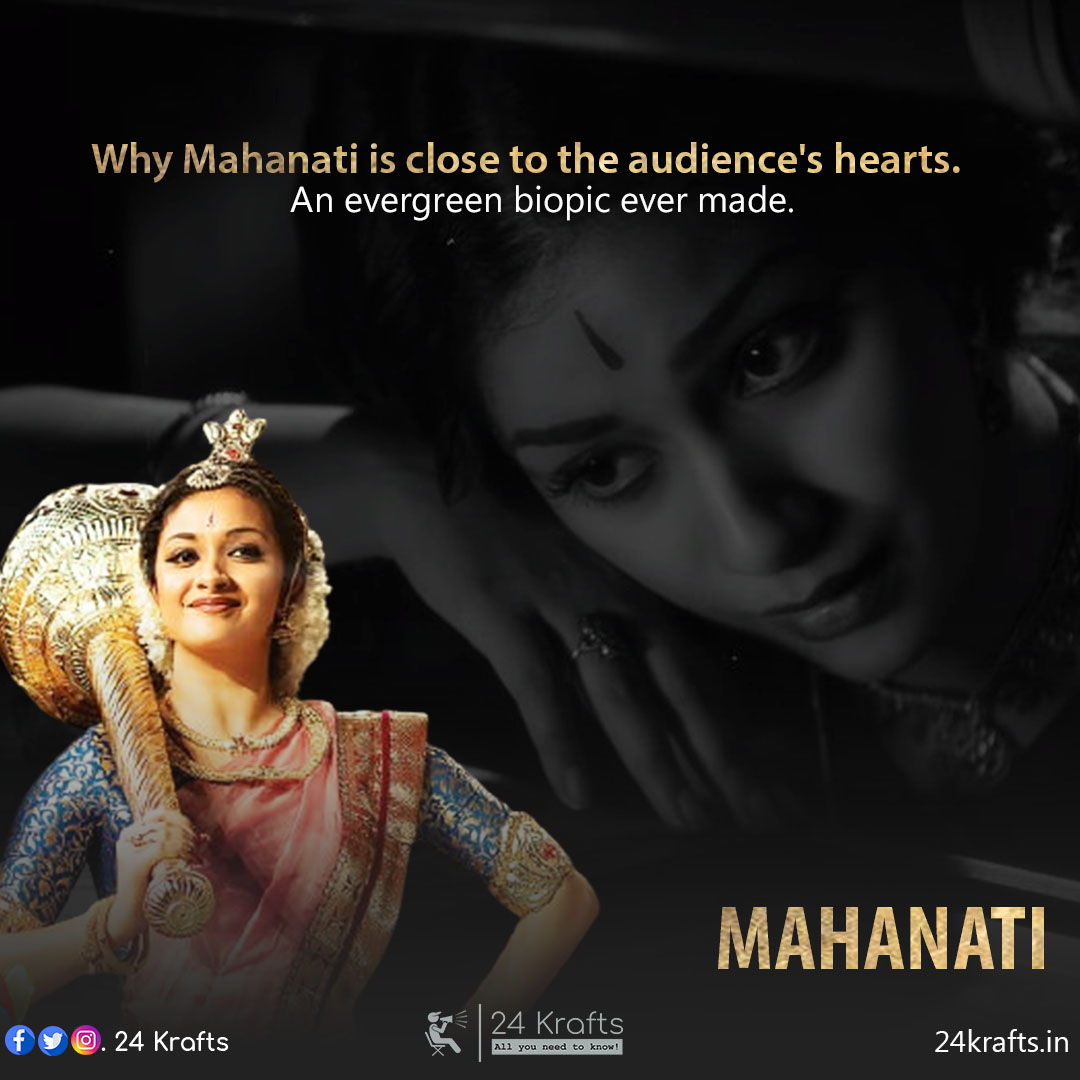Tales on friendship are of two kinds, the kind that sugar-coats reality into a pretentious show of perfection with fairy tale plots, and tragedies such as Iruvar, the kind that brings you to terms with the brutality and iniquity of relationships. Iruvar is a fictitious depiction of the duo of eminent politicians M.G.Ramachandran (M.G.R) and Karunanidhi as Anandan and Tamil Selvam. At a time when filmmakers hesitated to question authority and altered their scripts to avoid cuts by the censor board, there came Maniratnam’s bold move establishing the relationship between Cinema and Politics and the significance of power, with which the two were able to unite Tamil Nadu, in a setting beautifully rendered by the purity of friendship and layered through emotive characterization. Here Ratnam at last found a cinematic subject worthy of his gifts, Tamil cinema, music and politics, the three great obsessions of the Tamil people. Irvuar chronicles five decades in the history of Tamil cinema and politics. AR Rahman’s songs, one of his most inventive and versatile scores to date, evocatively and accurately reflect the sound and song style of films from each of those decades.
Struggling actor Anandan (Mohanlal) meets poet, screenwriter, and active politician Thamilchelvam (Prakash Raj), and this becomes the basis for a long, passionate and conflicted friendship. Anandan believes that together they can make cinema history while the poet is more interested in making political history. Enter Kalpana (Aishwarya Rai making her debut): An ambitious actress who obsesses about Anandan. After the death of the party’s leader Annadurai (Nasser), both Anandan and Thamilchelvam find themselves in contention for the party’s top position. Will their idealism and ambition draw them closer or make them rivals?
The key characters are, of course, based on real life screen stars turned politicians: The rise to fame of actor and cult-figure Anandan is loosely based on the life of legendary movie star Marudur Gopalamenon Ramachandran, Thamilchelvam is based on Muthuvel Karunanidhi and Kalpana on Jayalalitha. Cinema, music and politics are so deeply connected in the history and psyche of Tamils that Ratnam seems to have instinctively and profoundly known how to approach these as a filmmaker. The level of melodrama and fantasy (grandeur more than truth), the sweeping emotions (overwhelming more than intense) and the songs (enchanting more than clever) are stunning. Ratnam deftly moves from scenes of grandly scaled melodrama to understated, intimate moments that subtly reveal or betray something about his characters. Two of my favourite parts from the film: We see a sepia-tinged film within a film, it is Anandan as a masked hero come to save the princess. The sets (a fortress/temple with a giant bell) are exactly like the surreal ones from the MGR films from the late 40s (probably Rajakumari) but the sequence itself (a song more chanted than sung rising in tempo) with the hero on horseback galloping over hills, is modern, stylized: A cinematic nod to Kurosawa.
As the chanting fades, and the prince rides away with the princess, the scene morphs into a gigantic screen, and we now watch it inside the dark of a movie theatre with the actor Anandan watching the screen. Cut to: Anandan and the heroine waving from the theatre balcony to a throng of fans below, we see black and white posters of the movie everywhere. The moment is thrilling: At once you feel what movies are all about, the visceral high they give you. A moment known and shared by both, the fan and the actor. The other favourite bit from the film is more low-key: That poetic, refined beauty Tabu plays a school teacher and an intellectual, waiting for Selvam in his house. Drawn to his radical ideas and his political commitment, she has quit her job to become his mistress simply because he wrote and asked her to. But now she is full of doubt, what is she to him? Selvam rushes in, looks for her everywhere and then finds her sitting on the steps that lead to the second floor. He sits down a step below her and begins talking to her. She is quiet. After a pause, he asks her why and she wonders aloud who she is to him and he answers passionately: “My lover, my companion, my friend.” She lets her head gently fall on to the banister, the camera moves in closer: There are tears in her eyes and then slowly a smile, a smile full of a quiet joy.
An often remarked scene that follows this is the two of them lying on the floor, opposite each other, perspiring from having made love, as Santosh Sivan’s camera swirls above them, caressing them, and Selvam’s impassioned poem is heard over and over again. It is, as passionate movie scenes go, unforgettable. But I prefer the subtler, incandescent passage that precedes this. Aishwarya Rai is satisfyingly seductive, but the film belongs to Mohanlal and Prakash Raj who give great, controlled performances. Lal’s performance is nuanced, subtle, restrained while Raj is fiery, eloquent, and complex. A career best performance. Mani Ratnam can push an actor to do something that surprises even the actor. Apart from the pitch perfect work of the three leads, there are remarkable supporting performances, especially from Nasser, Tabu, Gouthami and Revathi. The dialogues by the director and his wife, Suhasini (a gifted dialogue writer) is both powerful and poetic.
Ditto for the song lyrics by Vairamuthu. The challenging and pleasurable task of writing tunes that will reflect the style and sound of five decades of Tamil film music is effortlessly met by Rahman. Each song is a jewel here. Ratnam pictures each song according to the look and sensibility of a particular decade in Tamil cinema history: Narumugaye is in sepia and features the actress Madhoo in a cameo as Tagore’s classic mythological heroine, Shakunthala. (Ratnam chose Madhoo for her face which recalls the features of classic actresses from the 40s and 50s).
Hello Mister Edirkatchi, set in a smoky club with Rai practically smoldering, cleverly imitates the faux-jazz inflected songs that dominated Tamil dance songs once upon a time. In Ayirathil Naan Oruvan the playback singer, Mano, sounds exactly like the playback singer who voiced MGR. And Mohanlal deftly mimes this legendary actor’s famous gestures (raising one hand and twirling it) when he danced and sang for five decades. Ratnam’s ability to always use large, sweeping themes as a backdrop to foreground more personal stories is one of his major achievements (not a drawback as some critics claim) and a unique style of telling a story in contemporary cinema.



